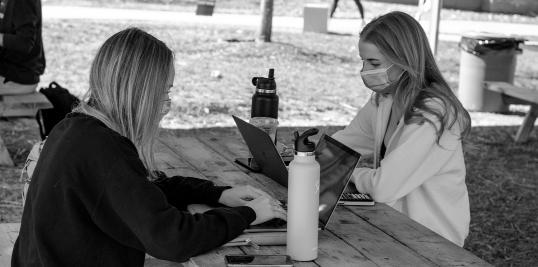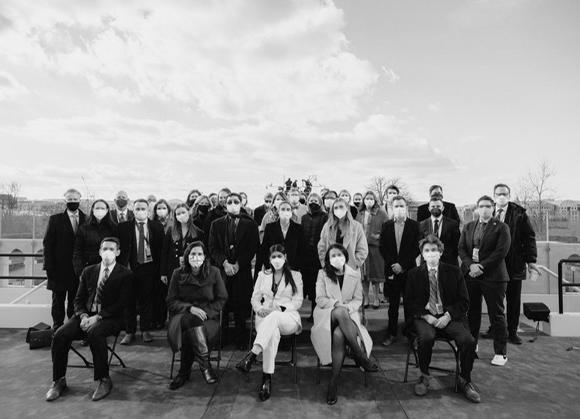
4 minute read
See Mental Health
Mental Health: Isolation stresses students
Continued from Page 1
Advertisement
Of those polled, 52% rated themselves below a five, and 36% rated themselves above a five (fives made up 12% of the answer pool). No respondents rated their mental health above a seven.
“To be blunt, [mental health is] not good, at least for myself and the people I spend my time with,” said freshman Caroline Parrish. “It’s difficult to find places to spend time with friends (especially if the weather is bad), and being completely alone for days at a time feels like punishment for a crime I didn’t commit.”
According to the survey, isolation and quarantine were major sources of stress, with approximately 78% of students identifying them as major stressors.
“While at the quarantine hotel, I barely received calls or anything from the university and no one asked about my mental health,” said sophomore Charlotte Lanier.
Another major source of stress for students were classes and workload, being identified by approximately 48% and 44% of respondents, respectively.
“We are all having a hard time balancing the stress of school [and] high expectations from professors even during such a stressful time,” one junior, who asked to remain anonymous, said.
Notably, only 11% of respondents named fear of getting COVID-19 as a major stressor.
Students have also had mixed reviews on the university’s programs to improve mental health. A freshman, who asked to remain anonymous, named the university’s wellness meetings as something that helped them improve their mental health. On the university’s behalf, the administration has been trying to assuage student concerns about mental health through the use of daily stories, events on Manchester Plaza and by attempting to improve the understaffed counseling center. “It’s a huge pressure on students; it’s a huge pressure on everyone,” said President Nathan Hatch. “People have been working 18 hours a day and weekends: it’s the whole community. I think we need to help each other … I would encourage students [to take time off and support friends].”
Overall, though, respondents are asking for just a little bit more help.
“A lot of students are struggling right now,” said senior Samantha Horowitz. “Wake [Forest] needs to prioritize students’ concerns about mental health and listen to what they need.”
Katie Fox/Old Gold & Black
Of the students surveyed, none rated their mental health above a seven on a scale of one to ten. Seventy-eight percent of students cited isolation and quarantine as major sources of stress.
WFU students leave mark on inauguration
A Wake Forest student and alum both worked behind the scenes at the inaugural ceremony
BY CATE PITTERLE
News Editor pittcj20@wfu.edu
This year’s presidential inauguration on Jan. 20 was far from normal — with waving flags in place of massive crowds, social distancing among the few guests in attendance and threats of violence after the Jan. 6 Capitol riots. Behind the scenes, numerous planners brought an unconventional, but still solemn, ceremony to life.
Among those planners were multiple Wake Forest students and alumni. Senior Matthew Mondello served as an intern on the Joint Congressional Committee on Inaugural Ceremonies (JCCIC). Jackson Blodgett, a 2020 graduate, served as Staff Assistant on that same committee.
“On a normal day, [my job] would entail answering phone calls from other offices in Congress,” Mondello said. “We always knew [the inauguration] was going to be unique because of the coronavirus pandemic, so eventually my responsibilities included escorting attendees to get tested for COVID-19, which was a mandatory requirement leading up to Inauguration Day.”
The threat of violence hung over the ceremony after the Jan. 6 riots at the Capitol. The perimeter around the inauguration was heavily guarded, with National Guard members deployed across the Capitol grounds.
Mondello noted that Washington, D.C.’s environment changed after the riots, though. As a lifelong resident of Arlington, Va., he was accustomed to pomp and circumstance surrounding typical inauguration ceremonies. This year, however, was different.
“I’ve been used to [a certain] environment pretty much all my life, but as the general public well knows, D.C. has undergone changes, obviously. It’s kind of isolating at times,” Mondello said. “You’re used to seeing tourists walking around. But with the COVID-19 pandemic and due to security concerns, [there was] an absence of pretty much everyone except staff.”
Mondello, who started his internship about a month before the Jan. 6 riot, was planning to go into work that day. He said he was called lastminute and told not to go in for safety reasons.
Though Mondello found out about the internship from a family friend, his experience had a surprising connection to Wake Forest. Blodgett, who served as a Staff Assistant in the JCCIC, was Mondello’s residence advisor in his freshman dormitory.



